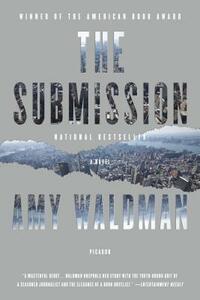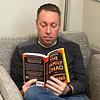Take a photo of a barcode or cover
Though-provoking. Reminded me a bit of a Tom Wolfe novel, albeit a little with a little less of his flamboyance. The characters often end up in corners fighting for things they're not sure they even believe in.
This book was a perfect example of why I frequently don't read modern fiction with a "point". It smacked you in the face with the point it was trying to make and meandered too long to get to the rising action. I read this for work since its this year's Buckeye Book community book and actually reminds me of another book that I read for my British culture class--White Teeth. Both seem to be trying to make points about race and how we view culture but seem to be preaching rather than allowing the reader to draw our own conclusions. I leave feeling like modern writers don't understand subtlety we tell people what we want them to think instead of expecting them to do it on their own.
I gave this 3 stars because I can't find fault technically with the book. It's well written and the characters are real (which is more than I can say for most books), but I felt like between all the preaching I didn't get to really see the characters develop.
I gave this 3 stars because I can't find fault technically with the book. It's well written and the characters are real (which is more than I can say for most books), but I felt like between all the preaching I didn't get to really see the characters develop.
This is a novel that demands a lot of its readers. That's not to say Amy Waldman's The Submission is difficult or dull -- in fact, it's the polar opposite of both. What it is, though, is a novel that makes readers think; that asks readers to challenge long-held beliefs and ideas, no matter how firmly they think those ideas are held. Notions you may judge to be obvious, aren't. And ideas that may have seemed odious suddenly may not seem that way either. To me, it's one of the best kinds novel: A novel that feels perfectly in tune with how our society operates (for better and, mostly, worse), and that demands that you confront your own feelings and beliefs.
Enough with abstractions. Here's the deal: Two years after the attacks of 9/11, a jury convenes to select a design for the memorial to be built at Ground Zero. The jury selects (without knowledge of the designer, since the submission process was anonymous) a design for a beautiful garden with flowing canals and the victims' names written on the walls in the shapes of the twin towers. Most everyone's happy, until...envelope please...the designer is revealed to be a Muslim. Or at least he's a guy with a "Muslim name": Mohammed Kahn.
The public outcry is immediate. And furious. How could a Muslim be allowed to design an "Islamic paradise" to effectively memorialize the "jihadist martyrs," not the victims, right-wing conspiracy theorists ask? Obviously, not all Muslims are terrorists, you bigoted fools, say Mo's advocates. So why shouldn't Mo, an irreligious American architect, be allowed to build his design, since the design was judged the winner based on aesthetics, not politics or religion? But Muslims are responsible for 9/11, counters the opposition, so it'd be, at best, insensitive,and at worst, horribly insulting, to allow a Muslim designer to memorialize them.
This culture war is the basis of the novel, and the frenzy that follows is examined through the eyes of several New Yorkers -- including Mo himself, and Claire Burwell, a 9/11 widow who is the leading proponent of Mo's design. But both of these characters begin seeing themselves through the lens the increasingly polarized public sees them. They begin to question and doubt, to yield, especially in Mo's case, to others' (often stereotypical) visions of them.
A Bangledeshi immigrant who lost her husband in the attacks, a woman who runs an organization called Save America From Islam, a buffoonish right-wing talk show host, and a down-on-his-luck blue collar fella named Sean who lost his brother round out the cast of characters that give this novel a really complete feel. And the media circus (another character is a less-than-ethical journalist) and the political wrangling (the governor of New York has national ambitions and is constantly waiting to see which way the wind blows and maneuvering politically) feel spot on. As do the difficult questions the novel raises.
Are moral absolutes really absolute? Why is bigotry so wrong (and idiotic...and harmful)? Can art ever really be separated from artist? The readers must grapple, especially those of the conservative persuasion, at whom Waldman often takes aim.
Much like the politically charged environment portrayed, this novel itself was also divisive. It's the only book I've seen wind up on a "most overrated novel of the year" list, as well as several "best of the year" lists. I tend toward the latter -- perhaps not one of the best books I've read this year, but a very, very good one, nonetheless. Waldman (a former journalist) writes lucidly and knows her stuff -- whether architecture or the ins-and-outs of a newsroom. You trust her, even if her characters piss you off. This is highly recommended!
Enough with abstractions. Here's the deal: Two years after the attacks of 9/11, a jury convenes to select a design for the memorial to be built at Ground Zero. The jury selects (without knowledge of the designer, since the submission process was anonymous) a design for a beautiful garden with flowing canals and the victims' names written on the walls in the shapes of the twin towers. Most everyone's happy, until...envelope please...the designer is revealed to be a Muslim. Or at least he's a guy with a "Muslim name": Mohammed Kahn.
The public outcry is immediate. And furious. How could a Muslim be allowed to design an "Islamic paradise" to effectively memorialize the "jihadist martyrs," not the victims, right-wing conspiracy theorists ask? Obviously, not all Muslims are terrorists, you bigoted fools, say Mo's advocates. So why shouldn't Mo, an irreligious American architect, be allowed to build his design, since the design was judged the winner based on aesthetics, not politics or religion? But Muslims are responsible for 9/11, counters the opposition, so it'd be, at best, insensitive,and at worst, horribly insulting, to allow a Muslim designer to memorialize them.
This culture war is the basis of the novel, and the frenzy that follows is examined through the eyes of several New Yorkers -- including Mo himself, and Claire Burwell, a 9/11 widow who is the leading proponent of Mo's design. But both of these characters begin seeing themselves through the lens the increasingly polarized public sees them. They begin to question and doubt, to yield, especially in Mo's case, to others' (often stereotypical) visions of them.
A Bangledeshi immigrant who lost her husband in the attacks, a woman who runs an organization called Save America From Islam, a buffoonish right-wing talk show host, and a down-on-his-luck blue collar fella named Sean who lost his brother round out the cast of characters that give this novel a really complete feel. And the media circus (another character is a less-than-ethical journalist) and the political wrangling (the governor of New York has national ambitions and is constantly waiting to see which way the wind blows and maneuvering politically) feel spot on. As do the difficult questions the novel raises.
Are moral absolutes really absolute? Why is bigotry so wrong (and idiotic...and harmful)? Can art ever really be separated from artist? The readers must grapple, especially those of the conservative persuasion, at whom Waldman often takes aim.
Much like the politically charged environment portrayed, this novel itself was also divisive. It's the only book I've seen wind up on a "most overrated novel of the year" list, as well as several "best of the year" lists. I tend toward the latter -- perhaps not one of the best books I've read this year, but a very, very good one, nonetheless. Waldman (a former journalist) writes lucidly and knows her stuff -- whether architecture or the ins-and-outs of a newsroom. You trust her, even if her characters piss you off. This is highly recommended!
Best thing I've read in awhile. Maybe a 4 1/2 or 4 3/4s but I felt like rounding up, the characters are so believable and multi-faceted.
This was a disappointing read. The side characters were far more interesting than any of the main characters.
The writing was gorgeous and made me look up words (which I love). It challenged my thinking and really gives a different perspective on post-9/11 America. The only part I felt lacked was the plot because not much actually happens in the novel and yet it's still a great novel. I'm glad I chose this as a book club selection because it will definitely generate great discussions and let us explore all of our different perspectives of what our lives were like post 9/11.
I really liked this book. I was worried that the subject matter (a 9/11 memorial, religion, death) would be hard-going, but the characters are so well-drawn and the insights into art and interpretation, grief and healing, expectations and regret are meaningful without being maudlin. A thought-provoking book that's still a good story.
The theme of submission is important in this book. Every character is unlikable (except, maybe, Asma) because of their pride and lack of willingness to "submit" to anyone's ideals but their own. Asma begins in a position of submission and then moves into a place of pride, though her pride, as opposed to most of the others', seems deserved and appropriate.
Random sexualization appears in the book and seems to have no real reason to move the plot forward. One might argue that the author was including the idea of making the subject of sexual objectification another part of the overall "submission" theme, but I don't give the author that much credit.
Every time the journalist appears in the story, it seems non sequitur. It would appear that the author, a journalist, could not bear to use journalism as a medium to advance the plot without also including a journalist. It was unfortunate.
Overall, I was engaged enough to read the book to the end, but it isn't one that I would highly recommend to others.
Random sexualization appears in the book and seems to have no real reason to move the plot forward. One might argue that the author was including the idea of making the subject of sexual objectification another part of the overall "submission" theme, but I don't give the author that much credit.
Every time the journalist appears in the story, it seems non sequitur. It would appear that the author, a journalist, could not bear to use journalism as a medium to advance the plot without also including a journalist. It was unfortunate.
Overall, I was engaged enough to read the book to the end, but it isn't one that I would highly recommend to others.



